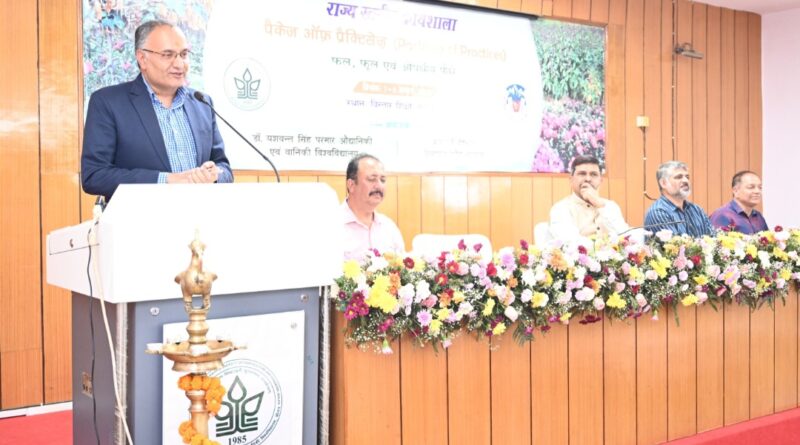Reduce cost of cultivation to maximize yield: State Level Workshop orgabised at Nauni
The eighth edition of the State-Level Workshop on Package of Practices (PoP) for Fruit, Flower and Medicinal and Aromatic Plants began at Dr. YS Parmar University of Horticulture and Forestry, Nauni. The two-day event is being organized in collaboration with the Department of Horticulture, Himachal Pradesh.
Scientists from the university, KVK and research stations along with officers from the Horticulture Department are participating in the workshop, where deliberations will focus on new recommendations for inclusion in the PoP. A PoP is a region- and crop-specific set of scientifically recommended guidelines that covers the entire crop cycle—from variety selection, land preparation and sowing to nutrient, irrigation, weed, pest and disease management, as well as harvesting and post-harvest handling. It serves as a complete guide aimed at maximizing yield, quality and profitability while ensuring sustainable and resource-efficient production.
Vice-Chancellor Prof. Rajeshwar Singh Chandel expressed gratitude to the Horticulture Department and called for strengthening collaboration to effectively address field-level challenges. He emphasized the need to reduce the cost of cultivation so that farmers gain better returns from the market. Highlighting the importance of inclusivity, he suggested that the PoP should incorporate low-cost technologies suitable for small landholders alongside advanced commercial technologies. Commending the state’s progress in natural farming, Prof. Chandel said that Himachal Pradesh has developed a credible agro ecological model on par with the best in the world. Despite heavy monsoon rains, he noted, farmers practicing natural farming have fared well.
Director of Horticulture Vinay Singh stressed that horticulture is the backbone of the state’s economy. To address climatic challenges, he said, the PoP must be regularly updated to include climate-resilient, water-efficient, drought-tolerant and disease-resistant varieties. He advocated increasing the state’s competitiveness in global markets by integrating both local and global knowledge and by promoting early-maturing varieties. He also urged educating farmers on the minimal use of chemical pesticides and incorporating natural farming practices into the PoP. He expressed confidence that a farmer-centric PoP will significantly benefit cultivators and contribute to achieving the goals of Zero Hunger and the Sustainable Development Goals.
Earlier, Dr. Inder Dev, Director of Extension Education, welcomed participants and informed that technologies developed by university scientists and discussed during the workshop would be compiled into farmer-friendly literature to aid efficient crop management. Dr. Sanjeev Chauhan highlighted the state’s achievements in fruit cultivation.
The first PoP workshop was held in 1991, and this is the eighth edition.
Over two days, the workshop will feature six thematic sessions covering Monitoring of Pesticide Residues in Fruits and Vegetables, Food Science and Technology, Plant Protection, Subhash Palekar Natural Farming, Floriculture and Medicinal & Aromatic Plants. The approved recommendations will be included in the POP.



